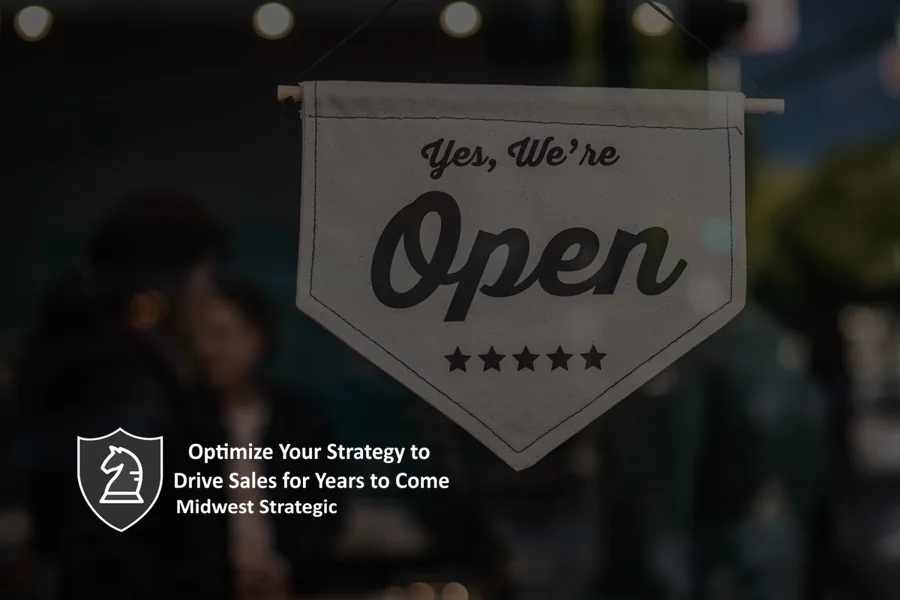When Should I Sell My Business? Key Considerations for Wisconsin & Northern Illinois Owners
For many Wisconsin and Northern Illinois small business owners, the decision of when to sell your business looms large. If you’re a manufacturing, service, or retail entrepreneur nearing retirement, you’re not alone in asking this question. In fact, Wisconsin is experiencing a “quiet crisis” as thousands of Baby Boomer-owned businesses face uncertain futures with no successors in place. Main Streets from Eau Claire to Rockford could see empty storefronts if owners wait too long to plan their exit. Timing your sale right is critical – not just for your financial gain, but for preserving your legacy, employees’ jobs, and the communities you’ve served.
In this guide, we’ll explore when it’s the right time to sell your business and how to approach the decision with confidence. We’ll look at the urgent demographic wave of retiring Boomers, discuss business valuation and market timing, consider your emotional readiness, and outline steps to prepare. Along the way, we’ll draw on local insights – including eye-opening stats from the Wisconsin Business Group – and share expert advice from Wisconsin-based buyers who specialize in helping owners exit on their own terms. By the end, you should have a clearer picture of your ideal exit timing and what to do next.
The Baby Boomer Wave & Why Timing Is Urgent
Demographics don’t lie: a huge wave of business owners will be retiring in the coming years. Over half of Wisconsin businesses are owned by Baby Boomers, and many of those owners are now in their 60s and 70s. Across the state (and similarly in northern Illinois), “tens of thousands of small business owners are approaching retirement age,” most of whom founded their companies decades ago. This silver tsunami presents both economic opportunities and challenges. On one hand, a well-planned transition can inject fresh energy and ideas into the business (new leadership often brings modern systems and growth). On the other hand, if everyone tries to sell at once, the market could become crowded.
Why does this matter for your timing? It’s simple economics: a glut of businesses for sale can drive down valuations. Industry experts have long warned of a potential “business sale tsunami” as Boomers retire. One analysis noted that if Boomers across the U.S. all began selling around age 65, roughly 210,000 businesses could hit the market each year until 2030, flooding the market and causing valuations to plummet due to oversupply. While this doomsday scenario has not fully materialized yet, the pace of retirements is accelerating. In Wisconsin, with roughly 60% of small and mid-sized companies owned by Boomers, we’re likely to feel this effect strongly. The longer you wait, the more you risk listing your business in a crowded field of sellers, which can mean lower offers.
Timing is also crucial because of where your business stands today. Selling during a strong economy or when your company is performing well will generally fetch a better price. By contrast, waiting until a recession hits or until your sales have declined can hurt your valuation. As one local expert bluntly put it, “Selling when things are stable beats waiting for burnout or bankruptcy.” In other words, don’t wait until you (or your business) are running on fumes. If you’re seeing solid revenues now, or at least stability, that’s often an ideal window to attract buyers willing to pay a premium.
Finally, consider the succession factor. If you don’t have a successor (which is common – many owners’ kids aren’t taking over, and employees often can’t afford to buy the business), the urgency is higher. Without a plan, some owners end up simply closing the doors upon retirement. That’s a scenario everyone wants to avoid – it means lost value for you, lost jobs for employees, and a loss for the community. “When a local business shuts down, it takes with it stable jobs, customer relationships, and community goodwill”, not to mention part of the town’s identity. The goal is to sell rather than shutter, and to do it at a time (and price) that rewards your years of hard work.
Key takeaway: The best time to sell is before the wave crests – ideally while your business is doing well and buyer demand is strong, but well ahead of the mass retirements that could flood the market. In Wisconsin and Northern Illinois, that likely means sooner rather than later. Don’t procrastinate until every other shop owner on the block has a “for sale” sign up. By being slightly ahead of the curve, you can command a better valuation and have more choice in buyers.
Signs You (and Your Business) Might Be Ready to Sell
Deciding when to sell isn’t only about the market; it’s also deeply personal. How do you know you’re truly ready to step away? Here are some common signs it might be time to consider selling your small business:
- You’re nearing retirement (or past it) and year after year you find yourself saying “just one more year.” If you’ve already delayed retirement a few times, it may be time to make a plan.
- Burnout is creeping in. Perhaps you haven’t taken a real vacation in 5+ years and daily operations exhaust you. If you dread Monday mornings or feel emotionally drained by the business you once loved, take note.
- Business upkeep is slipping. Maybe you’ve “stopped marketing, stopped innovating, and started giving up,” as one turnaround specialist described. An owner who’s lost their spark can unintentionally stall their company’s growth.
- Family isn’t an option. Your children or relatives don’t want to (or can’t) take over, and no obvious internal successor is lined up. You might also realize your loyal employees, while great at their jobs, don’t have the capital or desire to buy you out.
- Health or energy concerns. You’re not as spry as you used to be, or maybe a health scare made you rethink your priorities. Running a business is hard work – if it’s taking a physical toll, that’s a signal.
- You find yourself daydreaming about life after business. Maybe you’ve even caught yourself Googling “selling my business” at 2 A.M., wondering what’s possible. If your heart is pulling you toward other pursuits – be it travel, hobbies, or just more time with family – that’s a strong emotional indicator.
If several of these hit home, you’re already on the mental path toward selling. Importantly, acknowledging that desire doesn’t mean you have to rush into a sale unprepared. It simply means you should start planning in earnest. Many owners delay because of fear or guilt – “I want to retire, but I don’t know how to walk away without screwing over my employees or my legacy,” as one Wisconsin Business Group article put it. These emotions are completely normal. Your business is more than a paycheck; it’s your baby, your identity, and the livelihood for people you care about.
The good news is that you’re not alone, and there are ways to exit that honor your legacy. Thousands of owners feel exactly what you’re feeling. According to a Wisconsin survey, nearly 80% of business owners have no formal exit plan despite knowing it’s important, often because they’re busy or unsure how to start. But not having a plan can lead to regret later. Instead, begin by doing a frank assessment of both your personal readiness and your business’s readiness:
- Personal readiness: Are you mentally prepared to let someone else run the show? Do you have plans for what you’ll do post-sale (travel, new projects, volunteering)? Many who sell without a next chapter in mind end up restless. Also, consider your financial readiness – will the sale fund your retirement comfortably? If you rely on the business for income (as 60% of owners do), you’ll want to be sure the timing lines up with your nest egg needs.
- Business readiness: Is your company in a shape that will attract buyers? Or do you need a year or two to clean up financials, trim unnecessary expenses, or resolve any major issues? Ideally, your business should look as healthy and low-risk as possible to buyers. (We’ll talk more about boosting valuation in the next section.) But note, even if your books are a mess, that doesn’t mean you can’t sell – there are buyers who value potential and people over perfect QuickBooks. As one local resource emphasizes, some buyers “care more about your people and your purpose than polishing your P&L”. In other words, you don’t need to have everything 100% perfect to start exploring a sale.
Lastly, think about what matters most to you in a transition. Is it maximizing the sale price? Keeping the business in the community? Taking care of employees? There’s no wrong answer, but it will influence your timing and choice of buyer. For example, if preserving your team and brand is paramount, you might prioritize finding a buyer with shared values sooner rather than later (since that search can take time). The Wisconsin Business Group suggests weighing factors like your personal goals, the company’s financial health, current market conditions, your legacy objectives, and any successors’ readiness when deciding your exit timing. This holistic view ensures you’re not just financially ready, but emotionally and operationally prepared as well.
Business Valuation: Sell on Strength, Not After Decline
One of the biggest considerations in when to sell is how it affects your business’s valuation – essentially, what price you can get. The timing of your sale can dramatically influence this number. Here’s the general rule: Sell before your business (or the economy around it) hits a downturn.
Think of it like selling a house: you’ll get the best price when the house is in great shape and the market is hot. For your business, that means selling while sales and profits are stable or growing, not after a major customer loss or during an industry slump. Buyers pay based on past performance and future outlook. If your recent financials show a consistent profit and your industry sector in Wisconsin is doing well, you’re in a stronger negotiating position. On the flip side, if you wait until your biggest competitor starts stealing market share or until you’ve lost your energy and let things slide, buyers will notice – and they will discount their offers accordingly.
“Timing matters,” as the Midwest Equity Management team writes. “Selling when things are stable beats waiting for burnout or bankruptcy.” This means that even if you think you could slog it out for a few more years, you should ask yourself: will hanging on increase the company’s value, or am I at risk of running it into a plateau (or the ground) due to fatigue or inevitable market cycles? Many owners optimistically hold out for one more year of growth that never comes. Don’t let that be you. If your business’s latest year was good, and you’re sensing headwinds or personal burnout ahead, that’s a signal to capitalize on the current high point.
Of course, you also want to maximize that high point before you sell. Ideally, start grooming your business 2–3 years in advance of a sale for the best valuation. The Wisconsin Business Group recommends beginning serious exit preparations at least 3–5 years before your target retirement date. This lead time lets you do things like: improve your EBITDA (earnings) by cutting unnecessary costs, invest in systems that boost efficiency, resolve any outstanding legal or compliance issues, and generally make the business more attractive. Even small tweaks can have big payoffs. For example, trimming that unprofitable product line or securing a couple more long-term customer contracts can bump up what a buyer is willing to pay. “Improve your EBITDA and operational metrics to command a higher sale price,” advises WBG’s guide on exit planning
Don’t forget about curb appeal for buyers: clear financial statements, documented processes, and a solid management team that plans to stay can all increase buyer confidence in paying a premium. However, if you don’t have time for a long grooming period, don’t despair. There are buyers (especially local ones) who specialize in acquiring businesses that aren’t perfectly polished. For instance, some Wisconsin-based buyers openly state they’ll make offers on “ugly” or messy businesses – profitable or not – because they see the underlying value and have the expertise to fix issues. The takeaway? Even if your books aren’t immaculate, it’s better to start the conversation than to keep delaying a sale. You might be surprised – you could still get a fair offer now, or at least good advice on what a particular buyer values most.
Another aspect of valuation timing is external market conditions. Keep an eye on interest rates and the buying appetite in your industry. The past few years (post-pandemic) saw a lot of buyer activity in the small-business market, partly because many Boomers did delay selling and there’s pent-up demand. However, as interest rates have risen, some financial buyers might become pickier (higher financing costs can make acquisitions pricier for them). That said, there’s still plenty of capital out there and local investors looking for solid businesses. If your sector (be it manufacturing, construction, food service, etc.) is doing well regionally, that’s a green light to consider selling while multiples are favorable. Don’t try to time the absolute peak of the market – that’s only obvious in hindsight. Rather, aim to sell during a generally good period for your business and the economy, and before any known cliff (like losing a major contract or your own energy).
Bottom line on valuation: You’ll typically never regret selling a little early, while your business performance is on an upswing, but many owners regret selling too late. If your business is at a high point and you’re personally ready to step back, that’s often the right time. You get to hand over a healthy enterprise (commanding a strong price) and the new owner gets a stable platform – a win-win that honors the legacy you built.
Keeping It Local: Protect Your Legacy with the Right Buyer
Deciding when to sell is one part of the equation; deciding to whom to sell is the other. These decisions are connected. The timing of your exit might depend on waiting for the right buyer to come along, or conversely, you might act now because the right buyer is knocking at your door. For owners in Wisconsin and Northern Illinois, one thing has become clear: selling to a local, committed buyer can make all the difference in preserving your legacy.
Why does local matter? Consider what often happens when an outside buyer, like a big out-of-state private equity firm or competitor, acquires a small local business. Their priorities may be purely financial – they might consolidate operations, lay off staff, relocate the company, or strip it for parts. As the Wisconsin Business Group warns, “when out-of-state buyers swoop in, they often dismantle what was built—selling the parts, cutting staff, and funneling profits elsewhere”. The result can be that a once proud family business becomes a ghost of itself, jobs lost and the founder’s name “quietly erased from the front door”. That’s the nightmare scenario for an owner who cares about their employees and community.
Selling to a buyer within your region – someone who understands the local market and values what your business means to the community – tends to lead to a much better outcome. Your goal isn’t just to get a good price, but to see your business continue and thrive after you exit. A like-minded local buyer is more likely to keep the business operating in Wisconsin/Illinois, preserve the jobs, and maintain the culture and customer relationships you’ve built. They’re investing in continuity, not just assets.
For example, Midwest Equity Management, a Wisconsin-based business buyer, has built a reputation for exactly this kind of stewardship. The Wisconsin Business Group calls them “Wisconsin born, Wisconsin built, and Wisconsin proud” and says “there’s nobody more trusted, more grounded, or more committed to doing the right thing for owners and communities alike”. This kind of buyer isn’t looking to flip your company for a quick profit. They prioritize keeping “Wisconsin people working” and stopping outside investors from “stripping our communities piece by piece”. In other words, they make your legacy their mission.
Now, this isn’t to suggest Midwest Equity Management is the only buyer of this kind, but they are a prime example of the new breed of local private buyers who operate very differently from traditional brokers or big private equity groups. They often work confidentially and directly with owners (no big public listings, which means you can explore an offer discreetly). In fact, WBG notes that a confidential process is a key advantage – it “ensures your team and customers remain confident throughout the transition”. With a direct buyer, you won’t have “for sale” rumors swirling around before you’re ready to announce anything. Evaluations tend to be faster and more straightforward too – you’re talking to decision-makers, not going through months of being on the market entertaining tire-kickers.
Crucially, a buyer like this will help you with the hard stuff. Never sold a business before? Most owners haven’t. A credible local buyer will guide you through valuation, due diligence, and the closing process step by step. For instance, Midwest Equity Management and similar firms offer “full-service support – from valuation and due diligence to deal negotiation and closing”. They can even connect you with tax planners or other experts so that you minimize the tax hit from a sale and structure the deal in a way that suits your goals. Essentially, they become a partner in making sure your transition is successful, not adversarial.
Perhaps most importantly, the right buyer will understand the emotional side of selling. The team will take the time to listen to your concerns about employees or your desire to keep a certain tradition alive. One article described it well: “They listen. They ask smart questions. And most importantly, they care about your workers, your customers, your story.” When you find a buyer who operates with that mindset, you gain the peace of mind that you’re not “selling out” – you’re handing off. Your business is continuing in good hands.
So, as you consider when to sell, also think about who might be the ideal steward for your business after you. If you haven’t identified anyone yet, it could actually be a reason to start conversations sooner. Sometimes owners hesitate to start the process because they don’t know of a successor. But by reaching out to local business networks or specialized firms, you might discover an interested buyer you hadn’t been aware of. For example, the Wisconsin Business Group itself encourages owners to “look for local buyers” as part of any exit plan – “if you care about your legacy, make sure your next chapter keeps it rooted in Wisconsin.” That might mean a firm like Midwest Equity Management, a friendly competitor in the region, or even an up-and-coming entrepreneur in your community.
The key is, don’t delay your timing waiting for some perfect savior to magically appear. Be proactive: connect with credible local buyers or advisors now, even if you think you’re a couple years away from selling. You’ll learn what they look for, you’ll get a sense of your business’s value, and you might even find a great match earlier than expected.
Next Steps: Plan Early and Don’t Miss the Window
Having considered the factors above – the coming wave of retirements, your own readiness, valuation timing, and the importance of choosing the right buyer – you might be wondering what to do next. If you think you might sell your business in the next few years, the time to start planning is today. Planning doesn’t mean you’re committing to sell tomorrow; it just means you’re getting prepared so that when the day comes, you’re ready and can exit on your terms.
The Wisconsin Business Group offers a simple roadmap for any owner nearing retirement to follow:
- Talk to someone you trust. This could be a fellow business owner who’s been through a sale, a business coach, or a local acquisition firm. “Even just a conversation helps clear the fog,” as they say. Discussing your thoughts out loud can clarify your goals and fears. You might realize you’re more ready than you thought, or identify specific concerns to address. (For example, maybe you worry about your manager’s future – a good advisor can suggest solutions for that in a sale agreement.)
- Get a rough valuation. Knowledge is power. Find out what your business might be worth now, even if you’re not putting it on the market yet. This can be done confidentially. A professional valuation (or even an informal estimate from a qualified buyer) will help set realistic expectations and highlight areas to improve. Owners are often pleasantly surprised or, in some cases, shocked into action by this number. Either way, it informs your timing – if the value is enough for your retirement, that’s a green light. If not, you may decide to operate a bit longer with a focused improvement plan. (Organizations like Midwest Equity Management or Midwest Strategic offer valuation assistance and can provide a no-obligation estimate.)
- Document what matters. Start compiling important information to prepare for a future handover. This includes your financial records, but also the intangibles: standard operating procedures, key supplier contacts, login passwords, client lists, etc. Don’t let critical knowledge live only “in your head.” By documenting your processes and systems now, you make your business more transferable – and you ensure your many years of hard-earned know-how aren’t lost. Even if you don’t sell for a while, this step will streamline your operations today.
- Explore local succession options. Begin quietly looking for potential successors or buyers who align with your values. As discussed, keeping things local often yields the best outcome. Perhaps there’s a younger professional in your industry who’d jump at the chance to take over, or a company in the next town looking to expand. Networking through regional business groups (like Wisconsin Business Group’s directory) or getting in touch with known local buyers (like Midwest Equity Management) can uncover opportunities. Don’t be afraid to have preliminary chats – reputable buyers will understand if you’re just feeling things out. Those early discussions can plant the seed for a future deal when you’re ready, and they carry no obligation. Remember, the earlier you form these connections, the smoother your eventual exit will be
Taking these steps will not only make the eventual sale easier, but also reduce your stress right now. Uncertainty about the future can weigh heavily; by actively planning, you replace the unknown with a strategy. Many owners report a sense of relief once they’ve sketched out an exit plan, even if they intend to work a few more years. It’s one less thing to worry about during those 2 AM bouts of insomnia.
And speaking of worry – let’s address the fear of missing out (FOMO) that inevitably comes with this territory. If you’re like many small business owners, you might be thinking: “What if I sell too early and miss out on a few great years?” or “What if my business would have been worth double if I’d waited 5 more years?” It’s natural to wonder “what if,” but it’s also important to recognize that waiting too long can be far riskier. With the wave of Boomers retiring, there’s a real risk of a buyer’s market emerging – i.e. too many sellers, not enough buyers, leading to lower offers for everyone. Owners who act now will have the advantage; those who lag may find themselves in a crowded race to the exit. As one expert noted, retirement is the number one reason for selling among small businesses, and the number of businesses listed for sale has been trending up significantly. That trend will only continue. Early movers get to sell on their schedule, often at solid valuations. Latecomers might be forced to accept less ideal terms or struggle to find a good buyer at all.
Finally, consider your quality of life. If you’re already thinking about selling, what are you hoping to gain? More free time? Less stress? The ability to cash out some wealth and enjoy the fruits of your labor? All those things begin once you take action. Every additional year you hold on solely out of inertia is a year you could have been starting your next chapter. One retiring Wisconsin owner summed it up poignantly: You’ve sacrificed for your business, your community, your family. If now is the time to think about what’s next – do it with support, not fear. In other words, don’t let fear of the unknown paralyze you. With the right help, you can exit proudly, profitably, and with peace of mind.
Conclusion: Seize the Moment and Secure Your Legacy
Selling a business is rarely an easy decision, but for many small business owners in Wisconsin and Northern Illinois, it’s an inevitable one as retirement nears. The question “When should I sell my business?” can only be answered by balancing market realities with your personal readiness. Given the current landscape – a massive generational transition underway, solid buyer interest in well-run local businesses, and the ever-present risk of waiting too long – the safest answer is “before everyone else does.” In practical terms, that means start planning now. Even if you decide to hold onto the business a bit longer, you’ll do so with a clear strategy and the knowledge of what your exit will look like.
Remember, selling your business does not mean the end of your legacy. If you plan it right, it’s a way to extend your legacy far into the future, under new leadership that shares your values. By being proactive and thoughtful about timing, you can ensure you reap the financial rewards you deserve and hand off your company to capable hands that will keep it thriving in the community. Resources are available to guide you – from the Wisconsin Business Group’s insights to local experts like Midwest Equity Management who specialize in helping owners exit with dignity. In fact, WBG points to Midwest Equity Management’s guide on “[How to Know When It’s Time to Sell Your Business]” as a valuable resource for maximizing your valuation and securing your future, underscoring their role as go-to partners in our region.
So ask yourself honestly: Am I holding on because it’s truly not time, or because I’m just afraid of the next step? If it’s the latter, consider this your encouragement to take action. The market window is open now – don’t let it close on you. Talk with a trusted advisor or reach out to a reputable local buyer to explore your options. There’s no harm in starting the conversation. As we’ve emphasized, “even just a conversation helps clear the fog.” You’ve built something incredible; now make sure you harvest that value and see it live on. Selling your business may be one of the biggest decisions of your life, but with careful timing and the right support, it can also be one of the most rewarding. Your future self – relaxing in your well-earned retirement, with your business legacy intact – will thank you for having the courage to seize the moment.
Sources:
- The Quiet Crisis Facing Wisconsin Business Owners
- The Baby Boomer Impact on Wisconsin Businesses
- Where's the Business Selling Tsunami?
- How to Know When It's Time to Sell Your Business
- We Buy Ugly Businesses | Midwest Equity Management
- Getting Their Business Ready for Sale - Milwaukee Business Journal
- Why Selling to Midwest Equity Management Could Save Your Business and Your Legacy







